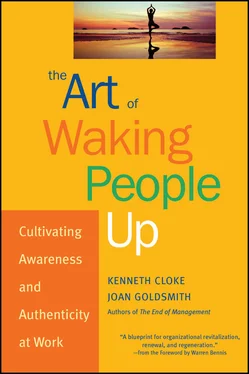We invite you to join us now in a process of mutual self-discovery. We encourage you to open yourself to new ideas and take risks you may have avoided. In the end, waking up, receiving honest feedback, and improving our skills, attitudes, and behaviors are essential parts of life and not to be feared. We hope you will take a chance on discovering who you are, be willing to express yourself authentically with colleagues, and change whatever in your organization stands in your way.
We hope you will accept the responsibilities of organizational citizenship by becoming the best person you possibly can be at work and helping others do the same. Only in this way can you make fulfillment, service to others, growth, learning, happiness, and love a part of every working day. These achievements are the best reward we can give ourselves. They are the most valuable form of wealth and the true aim of every kind of work.
Santa Monica, California
KENNETH CLOKE
November 2002
JOAN GOLDSMITH
Kenneth Cloke is director of the Center for Dispute Resolution and a mediator, arbitrator, consultant and trainer. Joan Goldsmith is an organizational consultant, coach and educator specializing in leadership development, and organizational change.
Cloke and Goldsmith have drawn on more than thirty years of practical experience in consulting with hundreds of organizations in the United States and internationally, including Fortune 100 companies, government agencies, schools, and nonprofits. They are coauthors of five previous books, including The End of Management and the Rise of Organizational Democracy and Resolving Conflicts at Work: A Complete Guide for Everyone on the Job , both published by Jossey-Bass.
The best way to make your dreams come true is to wake up.
Paul Valery
Part I Context: Cultivating Awareness and Authenticity
1
An Orientation to Awareness and Authenticity
I consider many adults (including myself) are or have been, more or less, in a hypnotic trance, induced in early infancy: we remain in this state until—when we dead awaken . . . we shall find that we have never lived .
R. D. Laing
We have all encountered employees who seem barely awake, who squander their work lives, who blind themselves to what is taking place within and around them, who speak and act inauthentically, who do not care about what they do, how they do it, to whom, or why. Indeed, many of our workplaces seem populated with the living dead, zombies who wrap themselves in a hypnotic trance, as psychiatrist R. D. Laing described, only to find that they have numbed themselves so thoroughly that they are unable to really live.
This indolent, apathetic, somnolent state has countless faces. It can be found in preoccupations with the past and unrealistic expectations for the future; in attitudes of denial, defensiveness, and disregard for the present; in frustration over failed change efforts; in reduced enthusiasm due to hierarchical privilege, bureaucratic indifference, and autocratic contempt; in a variety of mesmerizing relationships, processes, cultures, systems, structures, and attitudes that limit the capacity to perceive and act based not only on what is taking place within and around us and diminish who we are as human beings.
This zombification and atrophication of work life happens incrementally whenever people are punished for being aware and authentic and, as a result, become frustrated, give up, cease caring, and stop trying. It occurs when managers stop telling the truth and lie or keep silent about things that matter. It occurs when feedback is no longer oriented to how employees can succeed but to how they have failed—not just in their work but as human beings. It occurs when performance assessments become judgmental and hierarchical rather than supportive and participatory; when organizations separate honesty from kindness, integrity from advancement, and respect from communication.
Numbing oneself to experience is a natural response to unfulfilled expectations, unprocessed pain, unfinished grieving, unresolved conflict, and repetitive disappointment. When employees experience repeated losses, pain, conflicts, and disappointments, they often withdraw, shut down, or defend themselves from bruised feelings and unhappy thoughts. In doing so, they deaden themselves to experience and to the pain they would otherwise feel if they were fully awake. The extreme forms of this emotional state are catatonia and schizophrenia, but more familiar examples include apathy, distracted behavior, superficiality, equivocation, isolation, substance abuse, recurring illness, stress-related injuries, cynicism, excessive absenteeism, hypersensitivity, and unresolved conflicts.
When employees defend themselves against awareness and authenticity even in small ways, they diminish their capacity for growth, cease being fully alive and slip into a kind of unfulfilling stupor. How, in this state, is it possible for them to learn or change? What could conceivably motivate them to continue developing, sharpening, and expanding their skills? How do they ever overcome their tragedies or learn to celebrate their triumphs? How do they become responsible team members, improve the quality of their work, or risk changing what is not working?
In truth, their only real option in the face of these disabling experiences is to wake up and change their attitude toward what they have experienced. As they wake up, they increase their awareness, become more authentic, discover where their organization is not congruent with its professed values, and commit to improve their work processes, organizations, relationships, communities, and environments—not once or in isolation, but continually and collaboratively with others. This is how they actually transform their work lives.
As people wake up, they become increasingly conscious of the dysfunctional elements in their work environments and relationships and can see what is not working or might work better. They can then abandon the destructive patterns, adversarial attitudes, injured feelings, upsetting memories, and addictive behaviors that keep them mired in the past. They can release unrealistic expectations for the future and attitudes of defensiveness and denial regarding the past. They can take responsibility for what they do and who they are, for their behaviors and the results they produce. They can then assume the arduous task of transforming their personal, organizational, social, political, and economic lives and creating more satisfying, sustainable, and supportive work environments.
In spite of these possibilities, or perhaps because of them, it is rare that anyone welcomes opportunities to wake up, gladly seeks ways of stretching beyond what is safe, or enthusiastically embraces fundamental changes. We are often reluctant to push to the edge of our capacities, to experiment or try out new things. Instead, we resist, avoid, rationalize, and bolster our self-deception that things are fine as they are. As poet W. H. Auden poignantly noted:
We would rather be ruined than changed,
We would rather die in our dread
Than climb the cross of the moment
And let our illusions die.
Many of us resist change even when it is critical to our well-being; when the need to change is presented gently, empathetically, and with the best of intentions; when we understand that it could dramatically improve our lives. Instead, we become self-protective, accusatory, and suspicious and would rather retreat with our false ideas intact than climb “the cross of the moment” and let our comforting illusions die. Why? What are we so frightened of losing?
Читать дальше











